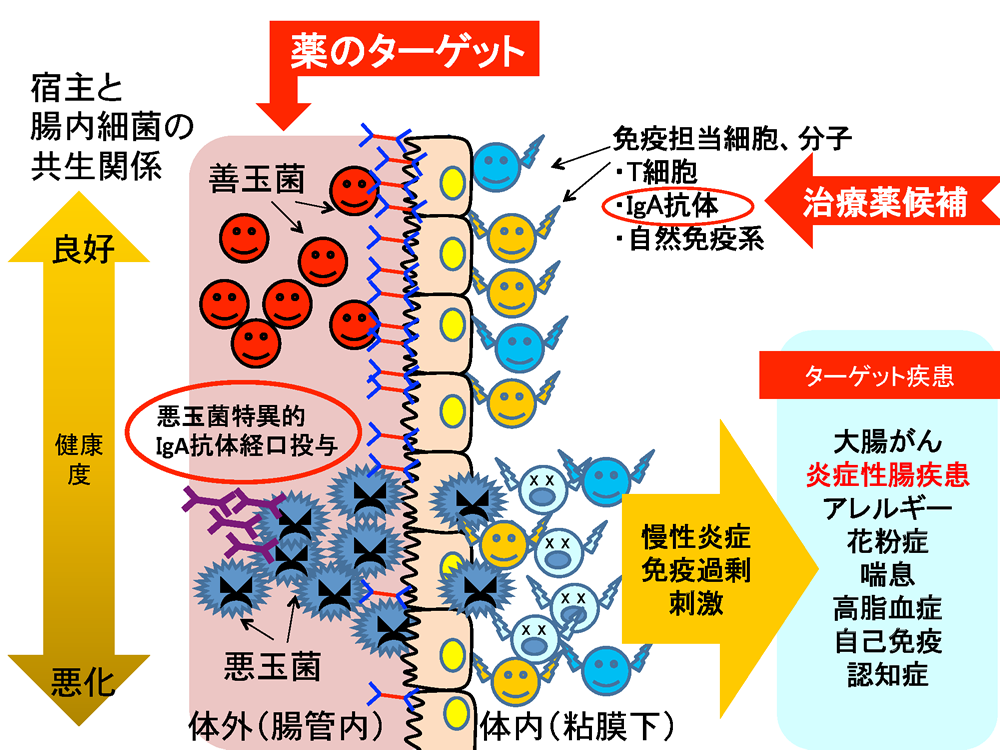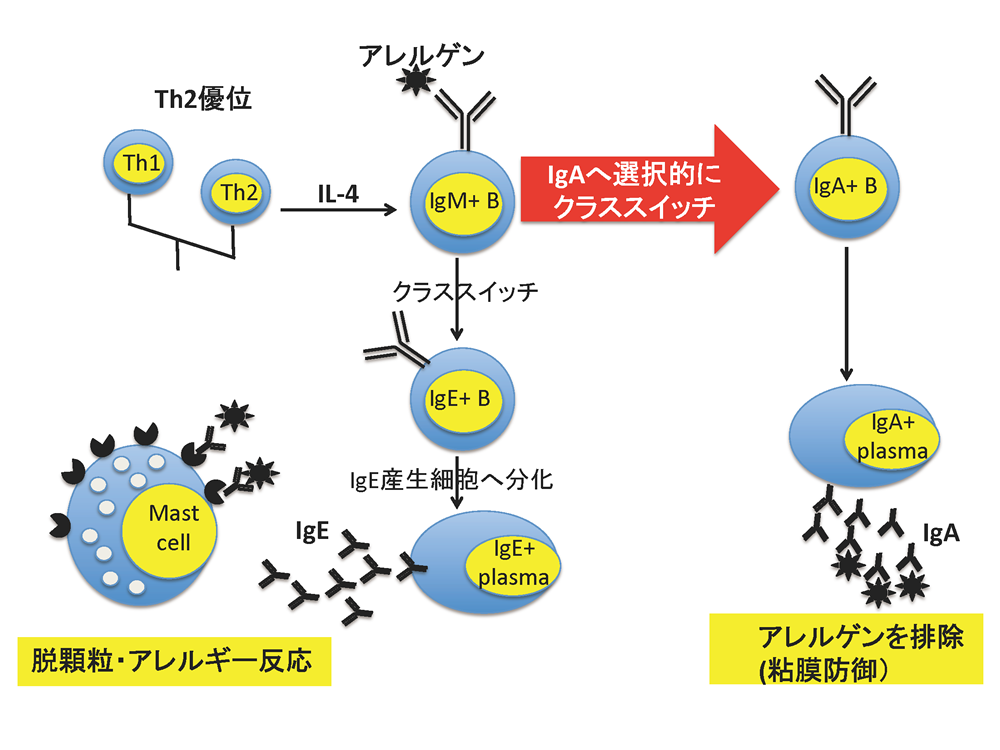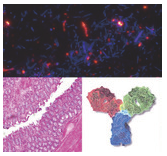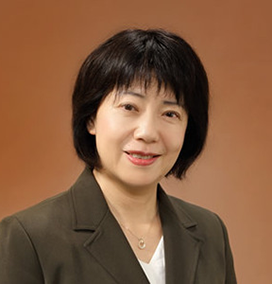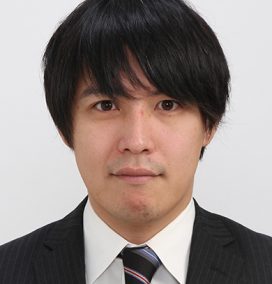Theme
Diversified antibody repertoire protects our body from microbial invasion. Our main question is how each intestinal IgA recognizes and targets a huge variety of gut bacteria.
About Research
From basic to applied research on immunoglobulin gene
The immune response has evolved to protect us from pathogenic infectious agents and toxic foreign substances. In acquired immune response, antigen stimulation of B cells induces two distinct genetic alterations in the immunoglobulin (Ig) loci: somatic hypermutation (SHM) and class switch recombination (CSR), both of which require an enzyme, activationinduced cytidine deaminase (AID). AID plays a crucial role in host defense but it introduces DNA cleavage into Ig loci and aberrantly into non-Ig loci causing lymphoma. Our aim is to answer‘ how AID’s activity targets Ig loci specifically’ and to understand the precise molecular mechanism of SHM and CSR.
We aim at applying the findings of our basic research to practical medicine.
1. Mechanism of gut microbial regulation by intestinal IgA
Recently dysbiosis (gut commensal microbial imbalance) is frequently reported to be associated with illnesses such as inflammatory bowel disease (IBD), obesity, cancer, etc. We found that the high-affinity intestinal IgA produced by SHM is important to control non-pathogenic gut bacteria as well as pathogens. We are analyzing the bacterial target molecule for each monoclonal IgA. We aim at the development of therapeutic IgA antibody to modulate gut microbiota leading to symbiosis (balanced hostmicrobial relationship in gut).
2. Search for IgA CSR inducer
We focus on searching a novel IgA CSR inducer, which may drive IgA CSR instead of IgE CSR at mucosal surface, elping prevent allergy, as well as enhance the mucosal immunity.
Publication
- Hirosuke Sugahara, Shinsaku Okai, Odamaki Toshitaka, Chyn Boon Wong, Kumiko Kato, Eri Mitsuyama, Jin-zhong Xiao, Reiko Shinkura. Decreased taxon-specific IgA response in relation to the changes of gut microbiota composition in the elderly. Front. Microbiol. DOI: 10.3389/fmicb.2017.01757.
- Okai S, Usui F, Ohta M, Mori H, Kurokawa K, Matsumoto S, Kato T, Miyauchi E, Ohno H, Shinkura R. Intestinal IgA as a modulator of the gut microbiota. Gut Microbes. 2017 Apr 6:1-7. doi: 10.1080/19490976.2017.1310357.
- Okai S, Usui F, Yokota S, Hori-I Y, Hasegawa M, Nakamura T, Kurosawa M, Okada S, Yamamoto K, Nishiyama E, Mori H, Yamada T, Kurokawa K, Matsumoto S, Nanno M, Naito T, Watanabe Y, Kato T, Miyauchi E, Ohno H, Shinkura R. High-affinity monoclonal IgA regulates gut microbiota and prevents colitis in mice. Nat Microbiol. 2016 Jul 4;1(9):16103. doi: 10.1038/nmicrobiol.2016.103.
- Wei M, Shinkura R, Doi Y, Maruya M, Fagarasan S, Honjo T. Mice carrying a knock-in mutation of Aicda resulting in a defect in somatic hypermutationhave impaired gut homeostasis and compromised mucosal defense. Nat Immunol. Mar;12(3):264-70, 2011.
- Shivarov, V, Shinkura R and Honjo T. Dissociation of in vitro DNA deamination activity and physiological functions of AID mutants. Proc Natl Acad Sci U S A 105, 15866-15871, 2008.
- Shinkura R, Ito S, Begum NA, Nagaoka H, Muramatsu M, Kinoshita K, Sakakibara Y, Hijikata H and Honjo T. Separate domains of AID are required for somatic hypermutation and class-switch recombination. Nat Immunol 5(7), 707-712, 2004.
- Shinkura R, Tian M, Smith M, ChuaK, Fujiwara Y and Alt FW. The influence of transcriptional orientation on endogenous switch region function. Nat Immunol 4 (5), 435-441, 2003.
- Shinkura R, Kitada K, Matsuda F, Tashiro K, Ikuta K, Suzuki M, Kogishi K, Serikawa T and HonjoT. Alymphoplasia is caused by a point mutation in the mouse gene encoding Nf-kapp b-inducing kinase. Nat Genet 22(1), 74-77, 1999.
- 免疫調節剤 特願2016-160573 発明者 新蔵礼子、山本 晃大
出願人 国立大学法人奈良先端科学技術大学院大学
Reiko Shinkura
Professor
MD, Ph.D.
Graduate School of Medicine, Graduate School of Pharmaceutical Sciences, Graduate School of Frontier Sciences
Kengo Sasaki
Project Associate Professor
Ph.D.
Hideo Negishi
Project Lecturer
Ph.D.
Naoki Morita
Research Associate
Ph.D.
Gao Peng
Research Associate
Ph.D.
Genta Furuya
Research Associate
MD, Ph.D.
Keishu Takahashi
Project Research Associate
Ph.D.
